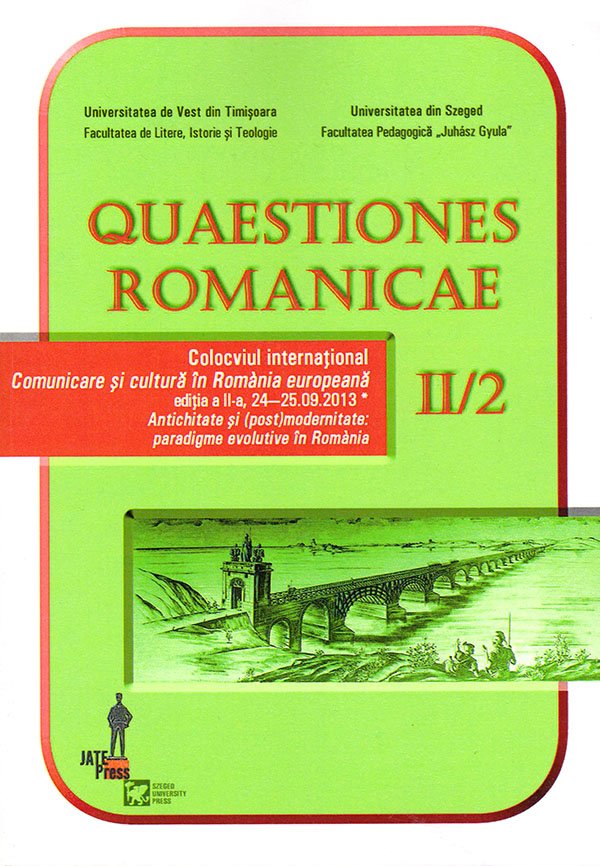Travaliul dorinţei în elegiile erotice properţiene (de la agon-ul eroic la agon-ul erotic)
Abstract: (The labor of desire in the erotic Propertian Elegies (from the heroic agon to the erotic agon)) The erotic Propertian Elegies imply a passionate model, structured as an agonistic pattern, an alternating scenario of amorous triumphs and decays, in a repetitive and ritualized manner, through which significant analogies glimpse between the erotic agon and the heroic agon. The agonistic dimension of the Propertian Eroticism reveals a deep relationship between the ancient agonistics (a competitive institution, root-bounded in the heroes’ cult) and eroticism as an individual, internal difference, which implies an agonistic scenario to be expressed in a culture of community values. Framed in a vast typology of the ancient agon (athletic, dramatic, musical, oratorical, political etc.), the erotic agon highlights the game with the individual difference, the structure of desire, the fractured birth of subjectivity (fractured between self and the other), in the space of a culture fed by collective guaranties. The ambiguity revealed in this erotico- elegiac context goes beyond the boundaries of eroticism, revealing a conception on corporality (the body as a symbolic space) and otherness (enforced with limits, boundaries), a way to manage desire that is equivalent to the effort of autofoundation (following the pattern of a citadel being raised). On the other side, in a picture including ancient literary genres, the elegiac erotic agon enacts the work (the labor) of self-release, of expressing the individual voice in a collective scenario, so that the erotic elegy’s function is to release the individual difference (through an analogy with the release of the familial/ social difference in the tragedy’s space). Whilst the tragic debate releases the familial difference (fixed by the myth, through the parricide and incest thematic), the elegiac debate continues the deconstructive work of the tragedy, releasing the individual difference through eroticism.
Keywords: erotic elegy, agon, subjectivity, corporality, otherness.
Rezumat: Elegiile erotice properţiene comportă un model pasional structurat pe tipar agonistic, şi anume un scenariu alternativ al triumfurilor şi prăbuşirilor amoroase, repetitiv şi ritualizat, prin intermediul căruia se întrezăresc analogii semnificative între agon-ul erotic şi agon-ul eroic. Dimensiunea agonală a eroticii properţiene dezvăluie o relaţie de profunzime între agonistica antică (instituţie competitivă cu rădăcini în cultul eroilor) şi erotism ca diferenţă individuală, internă, pentru a cărui expresie într-o cultură a valorilor comunitare recursul la scenariul agonal se impune. Încadrat într-o amplă tipologie a agon-ului antic (atletic, dramatic, muzical, oratoric, politic etc.), agon-ul erotic pune în lumină jocul cu diferenţa individuală, structura dorinţei, naşterea fracturată a subiectivităţii (fractura dintre sine şi celălalt) în spaţiul unei culturi alimentată de garanţii colective. Problematica revelată în acest context erotico-elegiac depăşeşte graniţele erotismului, dezvăluind o concepţie asupra corporalităţii (corpul ca incintă simbolică), respectiv asupra alterităţii (investite cu atributele limitei, graniţei), un mod de gestionare a economiei dorinţei echivalent efortului de autofondare (după modelul întemeierii cetăţii). Pe de altă parte, într-un tablou al genurilor literare antice, agon-ul erotic elegiac pune în scenă munca (travaliul) eliberării de sine, a exprimării vocii individuale într-un scenariu colectiv, astfel încât funcţia elegiei erotice este aceea a eliberării diferenţei individuale (prin analogie cu eliberarea diferenţei familiale/ sociale în aria tragediei). Dacă dezbaterea tragică eliberează diferenţa familială (fixată de mit prin tematica paricidului şi incestului), dezbaterea elegică continuă opera deconstructivă a tragediei eliberând diferenţa individuală prin erotism.
Cuvinte-cheie: elegie erotică, agon, subiectivitate, corporalitate, alteritate.
